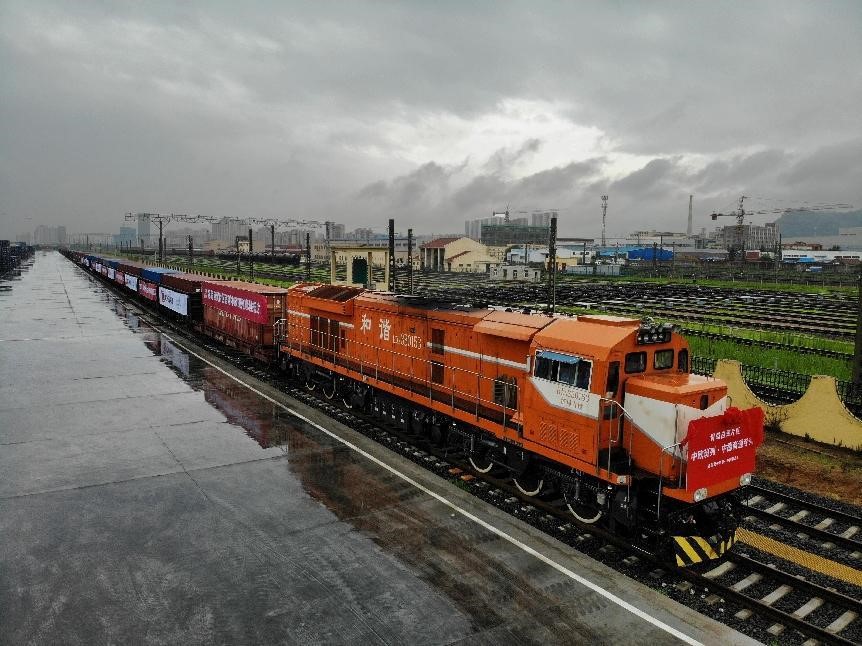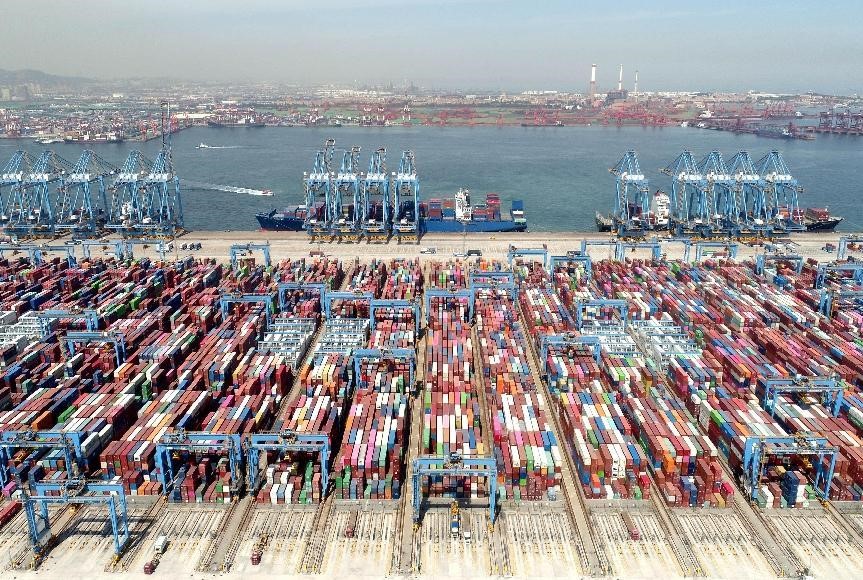By Zhao Lei ( People's Daily )
China is the world's second-largest economy, largest trader in goods and top recipient of foreign investment. The Chinese economy is deeply integrated with the global economy, and the country's economic diplomacy has become an important part of major-country diplomacy with Chinese characteristics.
China's economic diplomacy not only serves the development of China, but also safeguards the common interests of the international community. It pursues mutual benefit and win-win results.
"Opening up" is a keyword of China's economic diplomacy. In the past more than 20 years after China's accession into the WTO, China's overall tariff level has dropped to below 7.4 percent from 15.3 percent, much lower than what the country promised when entering the organization.

A fully loaded freight train arrives at a logistics park in the Qingdao area of China (Shandong) Pilot Free Trade Zone, July 17, 2022. (People's Daily Online/Xue Bing)
Last year, China's annual foreign trade value, seeing improvement in its scale, quality and efficiency, for the first time exceeded 40 trillion yuan (about $5.94 trillion). The country has maintained the world's top trading nation in goods for six years in a row.
Amid mounting global protectionism, China has made important contributions to building an open world economy with concrete actions.
In the next step, the country will steadily expand institutional opening-up with regard to rules, regulations, management and standards, further widen market access, reasonably shorten the negative lists for foreign investment access, and improve the system of pre-establishment national treatment plus a negative list for foreign investment, so as to foster a market-oriented and world-class business environment governed by a sound legal framework.
China has worked to build a globally-oriented network of high-standard free trade areas and to promote the negotiation and conclusion of high-standard free trade agreements.
Since establishing the first pilot free trade zone (FTZ) in 2013, the country has so far set up 21 pilot FTZs and the Hainan Free Trade Port.
China will advance its free trade agreement strategy to effectively connect domestic and foreign markets and relevant resources, in terms of "expanding scope, improving quality and raising efficiency," aiming to provide institutional support for its high-level opening-up and to serve the building of a new development paradigm.

The Honglian Bridge linking an island in the Nansha Free Trade Zone with other parts of Guangzhou has its main structure joined together in south China's Guangdong province, July 25, 2022. (People's Daily Online/Wei Jinsong)
The country has signed 19 free trade agreements with 26 countries and regions. The volume of trade between China and its free trade partners accounts for about 35 percent of the country's total foreign trade.
China has made joint efforts with relevant parties on the full and high-quality implementation of the Regional Comprehensive Economic Partnership, so as to make the world's biggest free trade agreement release more dividends.
At present, China is actively advancing its accession to high-standard economic and trade agreements such as the Comprehensive and Progressive Agreement for Trans-Pacific Partnership and the Digital Economy Partnership Agreement, which fully demonstrates the confidence of China's economic diplomacy.
China is also joining hands with relevant parties to advance high-quality Belt and Road cooperation.
So far, China has signed over 200 BRI cooperation documents with 151 countries and 32 international organizations. A large batch of flagship projects have been put into use or are under construction, such as China-Laos Railway, Piraeus Port, Mombasa-Nairobi Standard Gauge Railway, Addis Ababa–Djibouti Railway, Belgrade-Budapest Railway, China-Belarus Industrial Park and Jakarta-Bandung High-Speed Railway.
China is to consider holding the third Belt and Road Forum for International Cooperation this year, so as to inject new impetus into global development and prosperity.

Photo taken on Sept. 8, 2022 shows the Qingdao area of China (Shandong) Pilot Free Trade Zone. (People's Daily Online/Zhang Jin'gang)
China is actively pushing for closer international cooperation in development.
In 2021, the country proposed the Global Development Initiative (GDI). Aiming at building a global community of development, the GDI puts development first and the people at the center. It advances practical cooperation in key areas including poverty alleviation, food security, COVID-19 response and vaccines, development financing, climate change and green development, industrialization, digital economy and connectivity.
The GDI puts development high on the global macro policy agenda, strengthens policy coordination among major economies, and ensures policy continuity, consistency and sustainability. Besides, it fosters global development partnerships that are more equal and balanced, forges greater synergy among multilateral development cooperation processes, and speeds up the implementation of the UN 2030 Agenda for Sustainable Development.
More than 100 countries and many international organizations including the UN have voiced support for the initiative, and nearly 70 countries have joined the Group of Friends of the GDI.
China's economic diplomacy always puts safeguarding the stable and smooth flow of global industrial and supply chains in a very important position and adheres to the right course of economic globalization. It strives to promote the liberalization and facilitation of trade and investment, advance bilateral, regional, and multilateral cooperation, and boost international macroeconomic policy coordination.
It will surely make greater contributions to fostering an international environment conducive to development and creating new drivers for global growth.
(Zhao Lei is the Deputy Director-General of the Institute for International Strategic Studies at the National Academy of Governance.)















